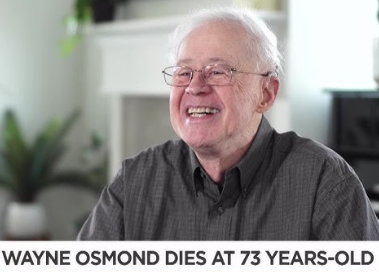 |
| (1951-2025) |
Wayne Osmond — a member of the Osmond Brothers, the singing siblings who brought bubblegum pop music and Utah wholesomeness to a worldwide audience — has died.
Osmond died Wednesday night, his brother Merrill wrote in a Facebook post Thursday, in a Salt Lake City hospital after suffering “a massive stroke.”
He was 73, according to The Salt Lake Tribune.
“I’ve never known a man that had more humility,” Merrill wrote. “A man with absolutely no guile. An individual that was quick to forgive and had the ability to show unconditional love to everyone he ever met.”
The children of George and Olive Osmond, the nine Osmond children were born and raised in Ogden. Wayne was born Aug. 28, 1951.
Four of the brothers — Alan, Wayne, Jay and Merrill — started as a barbershop quartet around Ogden in 1958. The quartet moved from Utah gigs to performing at Disneyland.
The group had a string of six gold albums (including a live album) from 1970 to 1973.
They hit No. 1 on the pop charts with “One Bad Apple” in 1970. Other hits followed, including “Double Lovin’,” “Yo-Yo,” “Down by the Lazy River” and “Love Me for a Reason.” Wayne co-wrote two of the group’s hits, “Hold Her Tight” and “Crazy Horses,” with Alan and Merrill.
Wayne sang baritone and was the guitarist of the group. He also was known as the onstage goofball.
On “The Andy Williams Show,” the quartet became a quintet, when younger brother Donny joined the group. Another recurring Osmond was the youngest brother, Jimmy, who would act as comic relief.
Donny would go on to become the most successful solo artist in the family. He maintained a long partnership with the one Osmond sister, Marie, that spanned decades with a ‘70s TV variety show and long concert runs in Las Vegas. Jimmy also had a successful solo career, particularly in the United Kingdom, where, at age 9 in 1972, he had a hit single with “Long-Haired Lover from Liverpool.”
The Osmond Brothers hit their peak of popularity in the early 1970s, right around the time “The Andy Williams Show” ended its run in 1971.
No comments:
Post a Comment
Note: Only a member of this blog may post a comment.